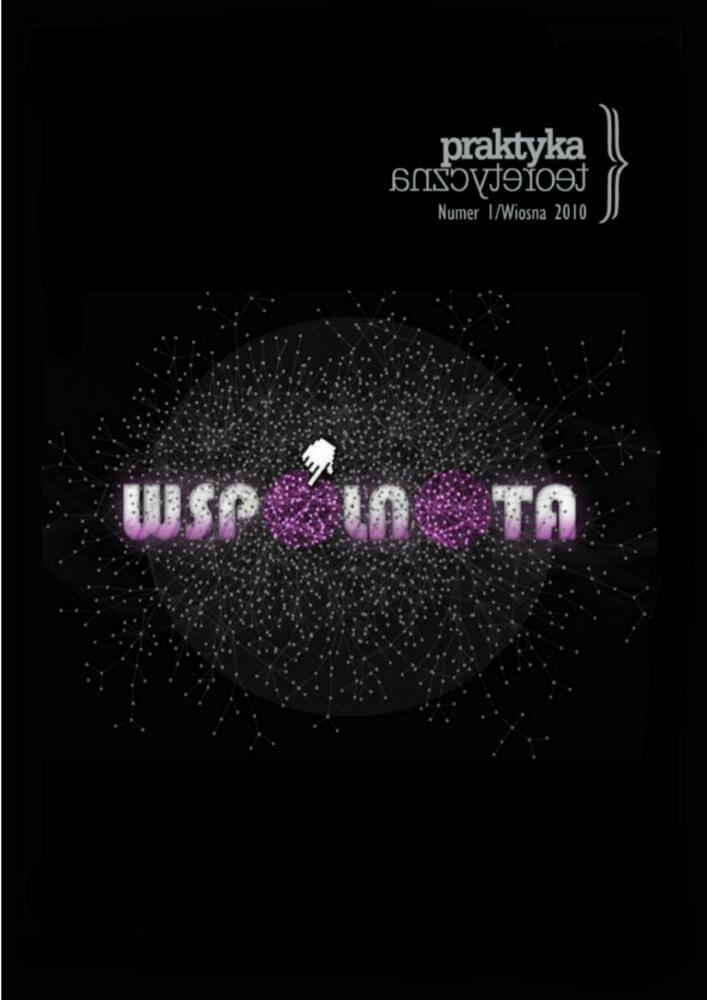Abstract
Essay faces the problem of determinacy of global capitalism processes for the reality of urban political life. The city is naturally communitarian form of human life and seems to be the place where radical pro-community politics could be undertaken. Already existing and operating forms of power could fruitfully influence the city social relations. Values and norms of conduct are broadly delegated on the urban space and materiality, thus conscious shaping of city space has severe consequences for community life. If a crisis of the political partly has its roots in metamorphoses of the cities, then also remedies, rising from the urban materiality and reestablishing political subjects, could be thought. City, as most real place of political life could be either reduced to the aggregate of consumers or reestablished as a political community. Due to this is the place where undesired course of action could be stopped, hence precisely here the radical democratic politics can emerge.References
Abriszewski K. 2008. Poznanie. zbiorowość. polityka: analiza teorii aktora-sieci Bruno Latoura. Kraków: Universitas.
Agamben G. 2008. Homo sacer: suwerenna władza i nagie życie. Warszawa: Prószyński i S-ka.
Arendt H. 2000. Kondycja ludzka. Warszawa: Fundacja Aletheia.
Beck U. 2005. Władza i przeciwwładza w epoce globalnej: nowa ekonomia polityki światowej. Warszawa: Wydawnictwo Naukowe Scholar.
Bielik-Robson A. 2010. Rozbita konstelacja: teologia Agambena między tragedią a mesjanizmem. W Agamben: Przewodnik „Krytyki Politycznej”. Warszawa: Wydawnictwo Krytyki Politycznej.
Certeau M. 2008. Wynaleźć codzienność: sztuki działania. Kraków: Wydawnictwo Uniwersytetu Jagiellońskiego.
Foucault M. 1980. Power/Knowledge: Selected Interviews and Other Writings 1972-1977. New York: Vintage.
Foucault M. 1995. Wola wiedzy. W Historia seksualności. Warszawa: Czytelnik.
Foucault M. 1998. Nadzorować i karać: narodziny więzienia. Warszawa: Aletheia.
Foucault M. 1998. Trzeba bronić społeczeństwa: wykłady w College de France 1976. Warszawa: Aletheia.
Freud Z. 1994. Poza zasadą przyjemności. Warszawa: Wydawnictwo Naukowe PWN.
Hardt M., Negri A. 2005. Imperium. Warszawa: W.A.B..
Laclau E. 2010. Nagie życie czy społeczne nie wiadomo co?. W Agamben: Przewodnik „Krytyki Politycznej”. Warszawa: Wydawnictwo Krytyki Politycznej.
Latour. B. 1992. Where Are the Missing Masses?: Sociology of a Few Mundane Artefacts. W Shaping Technology. Building Society: Studies in Sociotechnical Change. Cambridge: The MIT Press.
Mannheim K. 2008. Ideologia i utopia. Warszawa: Aletheia.
Marks K., Engels F. 1981. Manifest Partii Komunistycznej. W Dzieła wybrane. t. 1. Warszawa: Książka i Wiedza.
Nawratek K. 2008 Miasto jako idea polityczna. Kraków: Korporacja Ha!art.
Park R. 1967. On Social Control and Collective Behavior. Chicago: University of Chicago Press.
Sennett. R. 1996. Ciało i kamień: człowiek i miasto w cywilizacji zachodu. Gdańsk: MARABUT.
Swyngedouw E. 2007. The Post-Political City. In Urban Politics Now: Re-Imagining Democracy in the Neoliberal City. Rotterdam.
Thurow L. C. 1999. Przyszłość kapitalizmu: jak dzisiejsze siły ekonomiczne kształtują świat jutra. Wrocław: Wydawnictwo Dolnośląskie.
License
“Theoretical Practice” seeks to put into practice the idea of open access to knowledge and broadening the domain of the commons. It serves the development of science, thinking and critical reflection. The journal is published in open-access mode under the CC-BY-NC-SA 4.0 license (detail available here: http://creativecommons.org/licenses/by-nc-sa/4.0/). Articles published in the journal may be freely distributed, stored, printed and utilized for academic and teaching purposes without restrictions.
They should not be, however, used for any commercial purposes or be reconstructed into derivative creations. Access to the journal may not be limited or offered for a fee by any third party.
Prospective authors are obliged to fill in, sign and send back the publishing contract compliant with the CC licencing. [PL.pdf, PL.doc, EN.pdf,EN.doc].
According to this contract, authors grant the journal a non-exclusive right to publish their work under the creative commons license (CC-BY-NC-SA 4.0) without any financial obligation on both sides of the contract.
Before submission authors should make sure that derivative materials they use are not protected by copyright preventing their non-commercial publication. Authors are responsible for any respective copyright violations.
